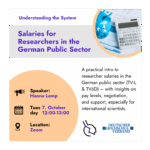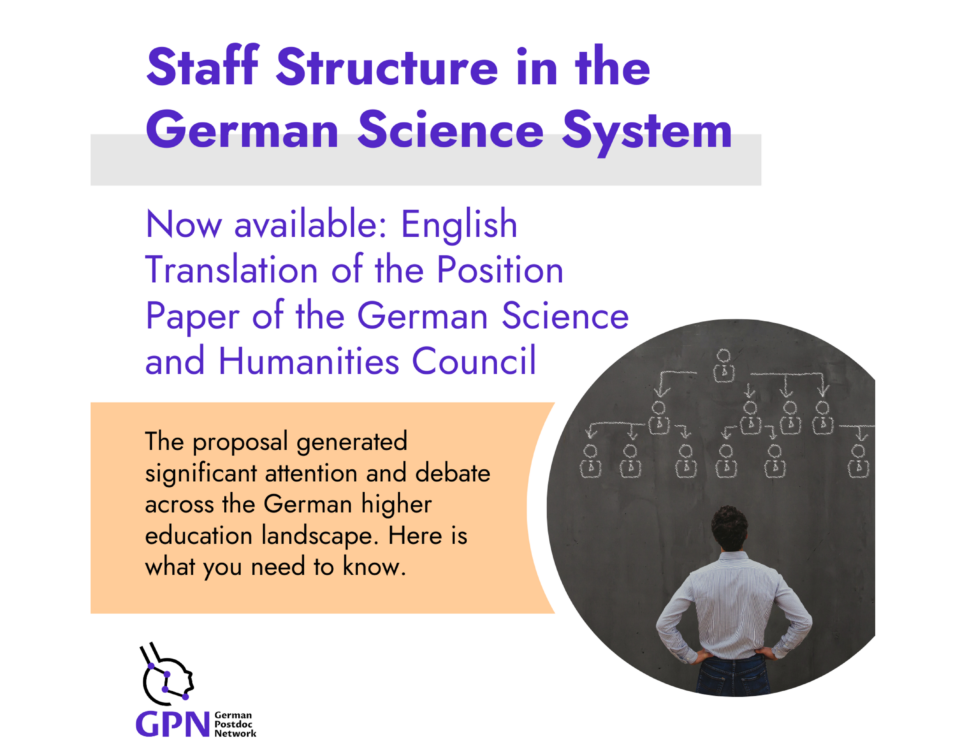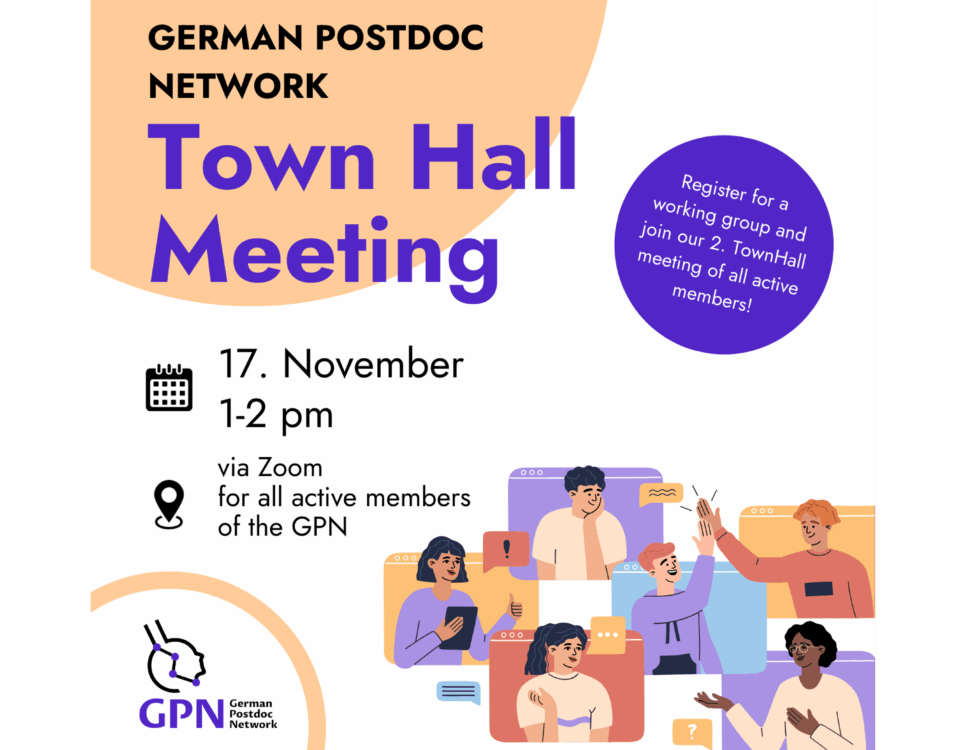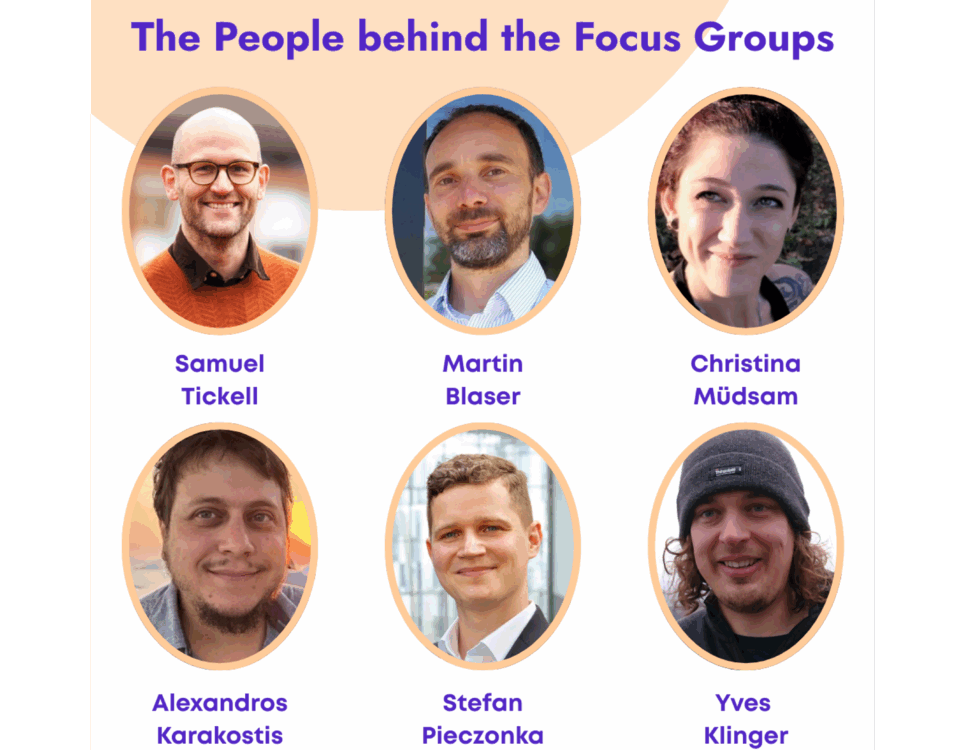ERA ACT: Call for Evidence - Feedback from the WG Advocacy
Early-Career Researchers at the Core of ERA Reform
—Drafted under the lead of Stefan Pieczonka and Yves Klinger (WG Advocacy)
As representatives of the German Postdoc Network (GPN), we voice the interests of early -career researchers (R2 and early R3) across diverse fields in Germany. While we support the overall aims of the ERA Act, we note that critical areas currently lack both clarity and ambition. The true promise of the ERA Act lies in its ability to create coherence where fragmentation prevails and to provide orientation and stability where emerging talents now face uncertainty and precarity.
1) National Commitments to R&D Investment:
For postdocs, chronic underfunding means heavy reliance on temporary contracts, the constant threat of job insecurity, and fierce competition for limited positions. This undermines the inherently cooperative nature of science, which depends on stability and collaboration, but instead forces researchers into rivalry over scarce resources, often at the expense of collective efforts and shared progress. Committing to the 3% R&D target ensures stable funding that strengthens careers, drives innovation in collaborative environments, and supports Europe’s leadership in research.
2) Alignment of Investments and Policies:
When investments and policies are better aligned across Europe, critical research areas can receive more coordinated support, enabling postdocs to contribute effectively without interruptions caused by fragmented funding or shifting short-term national priorities. This alignment ensures continuous career development by providing stable, long -term visions and seamless collaboration opportunities, allowing researchers to build expertise and networks essential for impactful scientific careers.
3) Improved Framework Conditions
a) Free circulation of researchers and scientific knowledge
Improved mobility and valorisation
Promoting geographical and intersectoral mobility is central for postdocs, whose trajectory often spans multiple institutions and countries. We identify two main obstacles that currently hinder flexible, cross-border career paths that strengthen both individual development and European research networks: lengthy visa procedures for researchers outside of the EU, and complex tax and social security regulations between EU member states, even for occasional work across borders. Free circulation and enhanced mobility measures mean researchers can work across Europe with fewer administrative hurdles, unlocking career options and collaborations. Despite the R1–R4 framework recognizing researchers across sectors, intersectoral mobility between academia and industry remains limited. Current career structures rarely support transitions to industry, and returning to academia is often difficult, discouraging movement and trapping researchers in precarious positions. Enhancing permeability between sectors would allow knowledge transfer, drive innovation, and increase the societal and economic impact of research. Supporting cross-sector career pathways would improve researchers’ opportunities, strengthen career security, and boost the attractiveness, sustainability, valorisation and overall impact of scientific knowledge and research careers in Europe.
Improved Careers
Improving research careers and enabling flexible cross-border mobility also requires addressing two core challenges of the current academic system, which are largely overlooked in the ERA Act and its policies: the lack of transparency and comparability of academic positions and qualification levels, and the prevalence of unattractive, precarious employment conditions.
The current academic system lacks transparent frameworks for positions, requirements, and competence profiles, and the absence of comparability directly undermines mobility and knowledge exchange. For researchers, moving between countries - or even between institutions within the same country - often means starting over, with prior qualifications and experience unrecognised. Short-term contracts, unclear expectations, and inconsistent job titles create an environment of disorientation, particularly at a stage when key life and career decisions are being made.
Without a European anchor, national implementation efforts risk remaining fragmented and ineffective. The ERA Act should explicitly call on Member States to implement the R1–R4 Researcher Framework in their national and institutional personnel structures, thereby ensuring comparable career progressions and qualifications. Such a mandate would enhance cross-country comparability, establish transparent career stages, enable sustainable career paths, and signal Europe’s commitment to supporting the next generations of researchers. Addressing the lack of transparency and structural inconsistencies is essential not only to retain and attract talent but also to ensure that researchers can plan their careers, engage fully in cross-border collaboration, and contribute their skills to Europe’s scientific excellence.
To fully realize the potential of the proposed policy changes and achieve the European Research Area’s ambition of making Europe the most attractive destination for researchers, it is essential to establish a systematic, Europe-wide monitoring mechanism for early- and mid-career researchers (R1–R3). Regular, comparable data on working conditions, career progression, remuneration, employment security, and wellbeing will provide the evidence needed to guide policy implementation, identify systemic barriers, and measure progress in EU-wide and national contexts. Without such a mechanism, even the best-intended reforms risk being fragmented or ineffective. Monitoring is therefore not an optional, it is a cornerstone for ensuring that ERA policies translate into tangible improvements in research careers and talent retention across Europe.
Open Science
Open science measures and FAIR access to publicly funded research empower researchers to build upon existing knowledge, collaborate efficiently, and gain greater recognition for their contributions. Moreover, publishing data and scientific outputs according to the FAIR principles upholds and advances the core values of the European Research Area by fostering openness, inclusivity, and international exchange, with particular benefits for researchers from smaller research institutions and the Global South.
b) ERA fundamental values
Upholding ERA fundamental values is essential. Safeguarding scientific freedom allows postdocs, often on short-term contracts and supervisor dependencies, to develop their own careers. Strengthening ethics and integrity ensures a fair and responsible research environment, protecting early-career researchers from structural pressures that risk undermining responsible research. Promoting gender equality and equal opportunities addresses persistent barriers at a career stage often coinciding with critical life choices, where unequal access to stability and advancement remains a reality. Together, these commitments directly improve the fairness and sustainability of researcher careers across Europe.
A systematic monitoring mechanism for early- and mid-career researchers would also be crucial for safeguarding core ERA values, including scientific freedom, ethics, gender equality, and equal opportunities. By tracking indicators such as gender representation, inclusiveness, discrimination, harassment, and mental health, it would generate robust, comparable evidence on persistent structural inequalities or ethical challenges. This would enable both the EU and Member States to address gaps in a systematic and accountable manner, rather than relying on ad hoc or anecdotal information. Monitoring the experiences of R1–R3 researchers would therefore not only enhance career prospects but also reinforce the ethical foundations of the European research ecosystem, ensuring it evolves as a fair, inclusive, and value-driven environment.
Main conclusion and call for action
The European Research Area Act sets out priorities that are highly relevant to Early-Career Researchers. We strongly welcome the ambitions to strengthen the European Research Area, including commitments to R&D investment, policy alignment, mobility, open science, and the upholding of fundamental ERA values.
To ensure that these measures meaningfully strengthen international competitiveness, improve research conditions, enhance the attractiveness of a truly aligned European Research Area, and establish a true “Fifth Freedom”, we consider three critical adjustments to the Act’s policies essential:
- The ERA Act must explicitly call on Member States to implement the R1–R4 Researcher Framework in national and institutional personnel structures, ensuring transparent career stages, recognised qualifications, and comparable career progressions and positions across Europe.
- The ERA Act must specifically incentivize Member States to direct R&D investments toward measures that directly address precarious employment by promoting attractive, stable academic positions, reducing reliance on short-term contracts, and removing structural barriers that undermine job security, equity, and long-term career planning.
- The ERA Act must require Member States implement a systematic monitoring system for early- and mid-career researchers (R1–R3), collecting comparable data on working conditions, career progression, remuneration, and well-being to identify barriers, inform targeted policies, and track progress in improving research careers, talent retention, and mobility across Europe.
We welcome further dialogue at any time.
The Working Group Advocacy of the German Postdoc Network (GPN)
What is the ERA ACT?
The European Commission is preparing a European Research Area (ERA) Act to strengthen the EU’s research and innovation framework, making it more binding and effective in areas like researcher mobility, academic freedom, infrastructure, and the long-standing goal of 3% GDP investment in R&D. A Call for Evidence ran from 6 August to 10 September 2025, gathering input from universities, research organisations and stakeholders on what the Act should prioritise. A broader public consultation will follow, with the Commission aiming to present the proposal in 2026.






